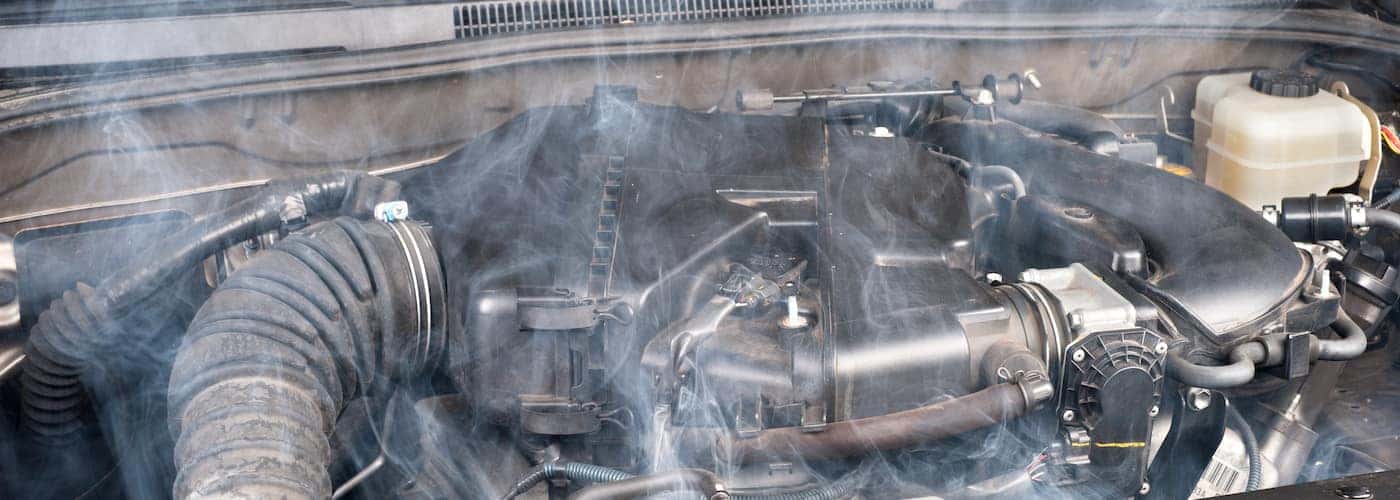
If your truck overheats, turn off the engine and wait for it to cool down. Check coolant level, leaks, radiator cap, and thermostat.
Experiencing a truck overheating issue can be alarming and potentially dangerous if not addressed promptly. When your truck overheats, it’s critical to take immediate action to prevent any further damage to your vehicle. By following simple steps and utilizing basic troubleshooting techniques, you can effectively handle the situation and get your truck back on the road in no time.
In this guide, we’ll discuss the fundamental steps you need to take if your truck begins to overheat, ensuring you can address the issue efficiently and safely.

Credit: www.roadrescueinc.com
Navigate As You Want:
Signs Of An Overheating Truck
Signs of an Overheating Truck: When your truck is overheating, there are several signs to watch out for. Firstly, keep an eye on the temperature gauge on your dashboard. If it starts to rise above the normal range, it could indicate overheating. Additionally, look for steam coming from the engine or a burning smell, which are clear indicators of overheating. Another sign to watch out for is a loss of power while driving, as this could be a result of an overheating engine.

Credit: www.hendrickatlanta.com
Immediate Steps To Take
Immediate Steps to Take: – Turn off the air conditioner to reduce strain on the engine. – Turn up the heat inside the vehicle to help dissipate heat. – Find a safe place to pull over away from traffic. – Call for assistance if needed for further help. Remember these important actions to address an overheating truck promptly and ensure safety on the road.
Possible Causes Of Truck Overheating
Possible causes of truck overheating include low coolant levels, leaks in the cooling system, a faulty radiator cap, a malfunctioning thermostat, and a malfunctioning water pump. If your truck overheats, you should immediately turn off the engine, allow it to cool down, check coolant levels, and inspect for any leaks before driving again.
| Possible Causes of Truck Overheating: |
| Low Coolant Level |
| Coolant Leaks |
| Malfunctioning Radiator Cap |
| Faulty Thermostat |
Steps To Fix An Overheating Truck
Check Coolant Level and Add if Needed: Start by checking the coolant level in the reservoir. If it’s low, add a 50/50 mixture of coolant and water until it reaches the proper level.
Inspect for Leaks and Repair: Look for any visible leaks in the cooling system. Inspect the radiator, hoses, and water pump for any signs of leakage. If you find any leaks, repair them immediately to prevent further overheating.
Replace Radiator Cap: A faulty radiator cap can lead to loss of coolant and cause overheating. Replace the radiator cap with a new one to ensure proper pressure and sealing.
Replace Thermostat: If the thermostat is stuck closed, it can cause overheating. Replace the thermostat with a new one to restore proper cooling system function.
Preventive Measures To Avoid Truck Overheating
When it comes to preventing truck overheating, there are a few key measures you should take to ensure your vehicle stays cool on the road. Regularly checking the coolant level is essential to avoid any potential issues. Make sure to inspect and maintain the radiator, as any damage or blockage can lead to overheating. Another important step is to flush and replace the coolant regularly, as old or contaminated coolant can affect the cooling system’s efficiency. Lastly, monitoring the temperature gauge while driving is crucial to catch any signs of overheating early on. By following these preventive measures, you can minimize the risk of truck overheating and keep your vehicle running smoothly.

Credit: m.youtube.com
Frequently Asked Questions On What To Do If Truck Overheats
How Do You Fix A Overheated Truck?
To fix an overheated truck, first, check coolant level and for leaks. Next, replace radiator cap and thermostat, and bleed coolant system. Also, ensure the water pump is working properly, and do a blown head gasket test if needed. Avoid driving until it’s fixed to prevent engine damage.
Can I Drive My Truck After It Overheats?
Do not drive your truck after it overheats to prevent engine damage and potential breakdowns.
What Happens If My Truck Overheats?
If your truck overheats, coolant levels may drop, leading to engine seizing or welding parts together, risking engine damage.
How Long Does It Take A Truck To Cool Down After Overheating?
It can take about 30 minutes for a truck to cool down after overheating.
Conclusion
If you find yourself in a situation where your truck is overheating, don’t panic. Follow these simple steps to address the issue and prevent further damage. By checking coolant levels, inspecting for leaks, and ensuring the radiator cap is secure, you can effectively manage an overheating truck.
It’s essential to prioritize your safety and take necessary precautions if your vehicle overheats. Remember, proactive maintenance is key to preventing overheating in the future.




